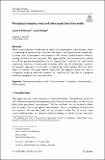Files in this item
Perceptual consciousness and intensional transitive verbs
Item metadata
| dc.contributor.author | D'Ambrosio, Justin | |
| dc.contributor.author | Stoljar, Daniel | |
| dc.date.accessioned | 2023-09-26T16:30:10Z | |
| dc.date.available | 2023-09-26T16:30:10Z | |
| dc.date.issued | 2023-09-26 | |
| dc.identifier | 290381140 | |
| dc.identifier | 9240c204-79bf-4b45-a066-2fe46c34cc8d | |
| dc.identifier | 85172134867 | |
| dc.identifier.citation | D'Ambrosio , J & Stoljar , D 2023 , ' Perceptual consciousness and intensional transitive verbs ' , Philosophical Studies . https://doi.org/10.1007/s11098-023-01992-w | en |
| dc.identifier.issn | 0031-8116 | |
| dc.identifier.uri | https://hdl.handle.net/10023/28452 | |
| dc.description | Funding: Australian Research Council (DP170104295). | en |
| dc.description.abstract | There is good reason to think that, in every case of perceptual consciousness, there is something of which we are conscious; but there is also good reason to think that, in some cases of perceptual consciousness—for instance, hallucinations—there is nothing of which we are conscious. This paper resolves this inconsistency—which we call the presentation problem—by (a) arguing that ‘conscious of’ and related expressions function as intensional transitive verbs and (b) defending a particular semantic approach to such verbs, on which they have readings that lack direct objects or themes. The paper further argues that this approach serves not only as a linguistic proposal about the semantics of ‘conscious of’, but also as a proposal about the metaphysics of conscious states. | |
| dc.format.extent | 22 | |
| dc.format.extent | 659457 | |
| dc.language.iso | eng | |
| dc.relation.ispartof | Philosophical Studies | en |
| dc.subject | Intensional transitive verbs | en |
| dc.subject | Consciousness | en |
| dc.subject | Awareness | en |
| dc.subject | Intensionality | en |
| dc.subject | Hallucination | en |
| dc.subject | BD Speculative Philosophy | en |
| dc.subject | P Language and Literature | en |
| dc.subject | T-NDAS | en |
| dc.subject.lcc | BD | en |
| dc.subject.lcc | P | en |
| dc.title | Perceptual consciousness and intensional transitive verbs | en |
| dc.type | Journal article | en |
| dc.contributor.institution | University of St Andrews. Arché Philosophical Research Centre for Logic, Language, Metaphysics and Epistemology | en |
| dc.contributor.institution | University of St Andrews. Philosophy | en |
| dc.identifier.doi | https://doi.org/10.1007/s11098-023-01992-w | |
| dc.description.status | Peer reviewed | en |
This item appears in the following Collection(s)
Items in the St Andrews Research Repository are protected by copyright, with all rights reserved, unless otherwise indicated.

